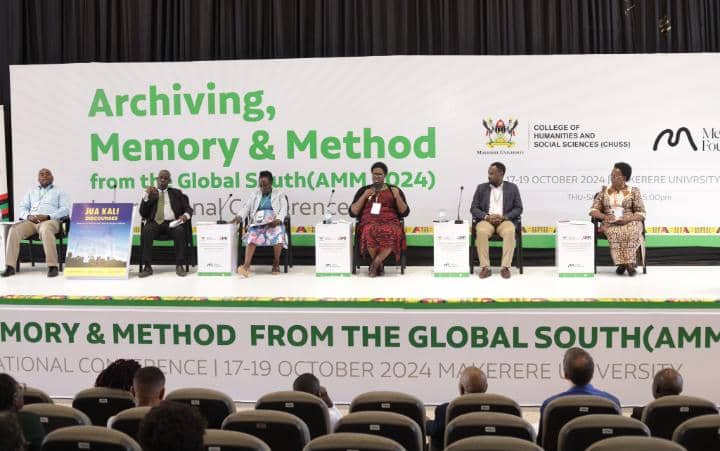By Julius Mugaga Tukacungurwa/ Umoja Standard.
Kampala, Uganda: Speaking during a 3-day Archiving, Memory and Method from the Global South (AMM2024) International Conference, Makerere University Vice Chancellor Professor Barnabas Nawangwe, represented by Prof. Henry Arinaitwe emphasized that archives are dynamic spaces where memory, identity, and knowledge converge, allowing us to rethink their role in shaping power, resistance, and reconciliation, particularly in the Global South.
The three-year project aligns with Makerere’s mission of knowledge creation, preservation, and transformation, positioning the university at the forefront of archival studies. Prof. Nawangwe noted, “Archives are not just about preserving the past, they are dynamic spaces where memory, identity, and knowledge meet.”
The conference aims to address gaps in records, especially regarding marginalized groups, and amplify diverse voices. By mentoring young scholars, the project ensures the field’s continued growth. He stated, “These conversations are not just theoretical; we have the potential to shape how we understand our history, resolve conflicts, and amplify diverse voices.”
On his part, Referencing to the 2020 burning of the university’s main building, Prof. Henry Arinaitwe that they were able to save the situation because recent records were duplicated or digitized.
He emphasized the need for proper document keeping, citing Uganda’s district disputes resolved through archives in London. “We can see the importance of archiving…the memory within what we keep and how we keep them.”
Prof. Arinaitwe stressed the impact of fires, wars, and floods on archives, highlighting the crucial role of digitization in preserving history.
In his Keynote address, Prof. Nathan Mnjama emphasized the importance of archives and their role in shaping historical narratives. He shared his personal journey from historian to archivist and highlighted the challenges of locating missing records related to Kenya’s history.
“As activists, we do appraisal, and in that process, we are actually determining who remains visible and who remains invisible, what is forgotten and what is remembered. We are trying to shape the memory of the world,” Prof. Mnjama noted.
He categorized migrated archives into several types, including records created in Western capitals, those physically airlifted from African countries, and those belonging to former federal institutions or shared common services.
“In the case of Kenya, it is recorded that over 1,500 files were physically moved to the UK on the eve of independence,” Prof. Mnjama stated.
He emphasized the need for professionals to pursue the return of migrated archives, citing various efforts, including diplomatic channels, professional associations, and international conventions.
“We need to chase those records,” Prof. Mnjama urged.
The address underscored the significance of archives in understanding historical contexts and the importance of collaboration among professionals to retrieve migrated archives.
“As professionals, we get it quite clear what constitutes migrated archives,” Prof. Mnjama.
The AMM2024 International Conference highlighted the ongoing efforts to locate and retrieve Africa’s migrated archives, sparking crucial discussions on historical preservation and cultural ownership.
Archive, Method, and Memory from the Global South (AMM) three-year journey.
Principal Investigator of ‘Archive, Method, and Memory from the Global South (AMM)’ Project Professor Josephine Ahikire, reflected, “A journey begins with one step, For us, this journey started three years ago, to revive archival research and make history a central discipline in African identity.”
Ahikire emphasized the project’s decentralized leadership and peer learning approach, stating, “You cannot know where the locus of knowledge is.” The project aimed to restore knowledge, history, and ownership of debates, informing curriculum development and reform.
Ahikire noted, “Archives are not just physical spaces, but political spaces.” This conference therefore solidifies the project’s commitment to continuing its intellectual agenda, promising to “make it bigger, make it better” and foster mutual learning.
Professor Hellen Nambalirwa Nkabala, Principal College of Humanities and Social Sciences noted, “Matters of archives and memory are very dear to us as the humanities because they form the basis and core of our existence.” This conference aim to amplify voices of the silenced and overlooked, exploring topics such as accountability, language preservation, and traditional music.
Prof. Nkabala emphasized that Archives are not merely static repositories of information; knowledge is created, contested, and reimagined. She praised the Mellon Foundation’s support and encouraged participants to forge new connections.
She added, this gathering has marked a significant step in recognizing and valuing contributions from the Global South on the global stage.
Dr. Charlotte Karungi Mafumbo, Chief Convener of the conference, expressed gratitude to the Mellon Foundation and project leader Professor Josephine Ahikire for their unwavering support.
Mafumbo recognized key contributors, including Dr. Edgar Taylor, Dr. Levis Mugumya and Dr. Pamela Khanakwa, acknowledging their crucial role in the conference’s success. She emphasized the significance of protecting cultural heritage, stating, “Our commitment to preventing the continued loss of culture and its preservation is important to our identity, culture, and norms.”
Notably, Mafumbo revealed that recently Uganda’s President, Museveni highlighted the importance of preserving Uganda’s history, culture, and heritage. In this regard, the conference aims to push for establishment of museums and enforce archives at institutional, family, and community levels, ensuring the protection of cultural heritage for future generations.
The Archives, Memory and Method from the Global South (AMM2024), International Conference at Makerere University, brought together distinguished scholars and experts to discuss the preservation of cultural heritage and the importance of archiving.


